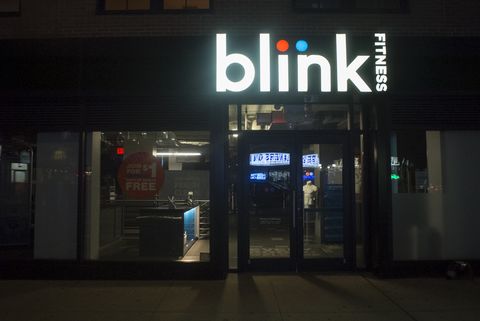Why is diflucan not safe during pregnancy

As we continue our quarantine, let us remember the luxuries of the past that we can no longer indulge. Bars, theaters, barbershops, and—most painfully for our physical well-being—gyms. During this time of isolation, I’ve taken a moment to reflect upon these places and think, ‘Do I really miss this place?’ For me, the gym was one luxury that I ended up not needing after all. At least, none of the three gyms that I once held memberships for (at the same time!) during one ridiculous period.
My problem began in a fairly typical way: I resolutioned myself. For the past decade, I’ve been one of the nearly half of Americans making fitness-related resolutions. For five consecutive years, I was also among the people who used their gym memberships less than once a month. Put the two together, and I had a comfortable little cycle going, always optimistic that I’d take the plunge and really commit—but that type of thinking, at least for me, wound up getting me into trouble.
What made me really wasteful was that I kept thinking that a change of scenery would be the spark that lit my fitness fire. Fueled by changing jobs, moving apartments, and general laziness, I allowed myself to stay indebted to Crunch, Planet Fitness, and Blink locations in far-apart neighborhoods. At a certain point, that needed to change.
Why You Can’t Just Drop a Gym Membership
Why didn’t I simply quit one gym before joining another? Why wait years before making this decision? Friends, I ask you: Have you ever quit a gym—or, more accurately, tried to quit a gym? The difficulty of quitting gyms is a high-end problem designed to be a high-end problem: Companies want your money, want to keep your money, and know damn well that you’re not likely to jump through hoops to save $20 a month.
“Gym memberships are notoriously hard to quit because most gym clubs do not want to allow the member to cancel their contract once they realize the hard work and commitment involved in becoming fit,” says attorney, David Reischer, Esq. “Gym club contracts are drafted in such a way as to not allow a person to quit without suffering a penalty. They are legally binding agreements that can can only be breached when the terms of the contract are unconscionable or otherwise specifically prohibited by law.”
“It’s important to read the entire contract before signing.”
And the gyms have one thing that you (probably) don’t: legal know-how. “Simply put, the contracts are so complicated because they are drafted by attorneys,” says attorney, Steven M. Katz, Esq. “Attorneys typically have seen every loophole or angle that a customer can use to wiggle out of a contract, so the drafting attorney has tried to seal up every potential loophole.”
Many make it notoriously difficult to end memberships, overcomplicating the supposedly simple service and making the contracts air-tight to ensure they live up to the phrase ‘health is wealth’. Most gyms force people to send a certified/notarized letter or to appear in person, often while paying a cancelation fee.
If you want to push the matter further to break your contract without a fee, you’ll probably not find much help. “Far and away, the most important thing to remember as a gym-goer is that courts strongly prefer the concept of ‘freedom of contract,’” Katz, the lawyer, told me. “If you sign your name to a contract, you are likely going to be bound by all terms contained in the contract. So, it’s important to read the entire contract before signing.”
I wondered why it took me so long to quit even one of the gyms. I’d walked past all of them during off-hours, but could never muster the energy to go actually go in and do it. In the spirit of taking control of my bank account and limit the pull of my gym guilt all in one fell swoop, I decided to embark on an odyssey to quit (that is, cancel my membership to) all three in one day.
How I Went About Quitting 3 Gyms in 1 Day
The first was Crunch ($9.95/month), about a 10-minute walk from my old apartment, a half hour from my new one, and far too long a ride from my current job to justify my membership. I originally joined before my wedding to buff up and lose the beer gut I’ve cultivated roughly since birth. This was three years ago, when I felt I had the world at my fingertips. Once I decided to end the contract, my morning plan of heading to the actual location in person was immediately shot to shit after I took too long to leave the house. I vowed to return that night.
With a day packed with meetings and a dinner reservation in another neighborhood, I wasn’t going to have time to go across town to quit gym number two, Planet Fitness ($10/month), which I joined after starting a copywriting job nearby. The low fee enticed me, even combined with the Crunch membership. What’s the harm in spending $20 a month in the name of fitness? Naïvely, I thought I’d visit both, but obviously never did. In fact, I only went to Planet Fitness a handful of times in my year at that job—I couldn’t shake the guilt of lifting in the middle of the day.
I decided to see if I can get the PF cancellation done over the phone. The chipper representative informed me that it is “pretty difficult” to quit Planet Fitness without going in person, although it can be done by sending a certified letter stating your name, reason for quitting, and gym ID number. My ID number could’ve been five digits or 500 and I wouldn’t know the difference—but I could get two out of three, so I gave it a shot.
For my letter, I went to the post office and scribbled down that I no longer work for company near gym. I was a little confused about what a ‘certified letter’ actually entails, but the chill guy at the window explained that once received, the gym would confirm receipt. I paid $4.65 and left the post office in a surprisingly good mood: One gym down (I thought), two to go.
Jeremy Glass
I called Crunch to see if my luck would carry over and gave my spiel. After waiting on hold, I was told it’s “pretty much impossible” to cancel over the phone. In my heart, I know that’s probably not all true—I cannot fathom how such a low-stakes contract is so hard to negotiate—but such is life. I’s have to show up in person to avoid being charged for the following month.
Blink ($15/month + $10 towel service), the final gym, should’ve been the easiest to quit as it was the closest to my office—but I couldn’t manage to find a spare 20 minutes to march over. Before I moved into an apartment with a gym in it, I only went three times in nine months—it was a dash too far away to justify going at lunch. The first time I tried to go, I received an urgent Slack to come back to the office and had to change back into my work clothes without showering. I did not smell cute.
On my way over to Blink after a meeting. But that finally changed. I got to Blink, filled out a form, and paid a $24 “prorated fee” which gives me access to their facilities until the end of that month. Two down.
To finish my quest, I was intent on making it to Crunch after dinner. That would be a tight window: My wife was pregnant and would want to turn in early, I had a Skype interview with two comedians at 11, when the gym closed—too many things all at once. When I left the restaurant, I was reconsidering plan Gym Zero. But I was resolute.
I walked to Crunch (burning about 40 calories!) and marched into the sweat-and protein-scented facility. When the woman at the desk asked for my signature and why I was leaving, I considered telling her that I was just following through on a personal fitness resolution. My third gym down—and the first fitness resolution that I’ve ever actually accomplished.
How You Might Be Able to Quit Your Gym Without the Headache
Not ready for a marathon of phone calls and gym visits like me? The lawyers have some strategies.
Reischer adds that the easiest way to break a gym contract is not by my approach. Instead, calling your credit card company to dispute the charges and prevent further charges is the way to go.
“Breaching a contract is always the last resort.”
“Typically, a person that unilaterally cancels the contract will not face a lawsuit because most gyms collect sufficient fees up front that they will not waste their time pursuing a lawsuit for the remaining money due,” Reischer says. “Alternatively, try talking to the gym management and see if the membership can be transferred to another family member or temporarily frozen. Breaching a contract is always the last resort unless a person is willing to suffer the consequences of a potential lawsuit even if the chances of the gym bringing a lawsuit is extremely remote.”
As far as easier methods, Steven Katz reveals one more trick up his sleeve: a doctor’s note.
“There is one argument against the in-person cancellation policy that I have used successfully,” Katz says. “If the person is cancelling the membership due to an injury or other unforeseen circumstances, the customer may be able to fax or email a doctor’s note which will often negate the requirement for the customer to cancel in-person.”
You Might Want to Wait On Quitting Your Gym for Now
Bill TompkinsGetty Images
Committing to quitting will save me over $500 annually. This speaks to how self-improvement is an easily exploitable tool of capitalism; a means of making a quick buck off of the insecurities of millions of Americans (particularly, me). But then again, I’m not exactly innocent in this situation, either—I easily could have avoided this mess entirely by being more responsible, or, y’know, actually using any of my memberships. Still, this experiment wound up helping me to get more realistic about my commitment to fitness while taking more control of my finances.
Right now, though, you shouldn’t worry too much about your gym membership eating up your bank account. I reached out to Crunch, Planet Fitness, and Blink for comment about how they’ve adjusted their policies in light of the current coronavirus pandemic. Reps from Planet Fitness and Crunch both confirmed that dues have been frozen for all members while clubs are closed due to the current situation. A rep from Blink declined to comment on cancellation policy, but noted that Blink members had their memberships frozen at the time of the club closures and have not been billed since then.
I’ll probably join more gyms in the future, whenever I move jobs or house again. Will I make the same $45-a-month mistake then? I’d like to think I’ve learned my lesson, but my impulse control is a little like my muscles: If you don’t use it, you lose it.
Men’s Health Subscription
SHOP NOW
Source: Read Full Article



